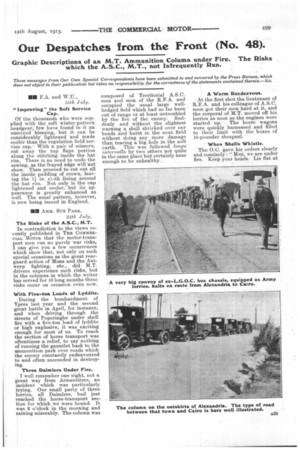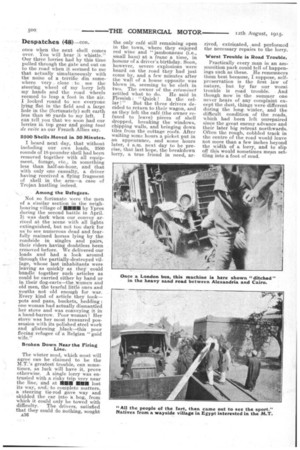Our Despatches from the Front (No. 48).
Page 9

Page 10

If you've noticed an error in this article please click here to report it so we can fix it.
Graphic Descriptions a an M.T. Ammunition Column under Fire. The Risks which the A.S.C., M.T., not Infrequently Run.
These messages from Our Own Special Correspondents have been submitted to and censored by the Press Bureau, which does not object to their publication but takes no responsibility for the correctness of the statements contained therein.—ED.
MN F.A. and W.U.,
15th July.
"Improving" the Solt Service Cap.
Of the thousands who were supplied with the soft winter-pattern headgear', few have found in it an unmixed blessing, but it. can be considerably lightened -and made cooler than the regulation field service cap. With a pair of scissors, cut away the top flaps portion along the stitching inside the hat rim. There is no need to undo the sewing, as the frayed edge will not show. Then proceed to cut out all the inside padding of crown, leaving the V, in. cioth lining around the hat rim. Not only is the cap lightened and cooler, but its appearance is greatly enhanced as well. The usual pattern, however, is now being issued in England.
• A. SUB PARK,
• 24th Iv7:(1.
In contradiction to the views recently published in THE COMMERCIAL MOTOR that the motor-transport men run no purely war risks, I can give you a few occurrences whici show that, not only on such special occasions as the great rearguard action of Mons and the Antwerp fighting, etc., did ALT. drivers experience such risks, but in the columns in which the writer has served for 10 long months these risks occur on occasion even now.
With Five-ton Loads co! Lyddite.
During the bombardment of Ypres last year and the second great battle in April, for instance, and when driving through the streets of Poperinghe under shell fire with a five-ton load of lyddite or high explosive, it was exciting enough for most of us. To reach the section of horse transport was oftentimes a relief, to say nothing of running the gauntlet back to the ammunition park over roads which the enemy constantly endeavoured to and often succeeded in destroymg.
Three Daimlers Under Fire.
I well remember one night, not a great way from Armentieres, an incident which was particularly trying. Our small party of three lorries, all Daimlers, had just reached the horse-transport section for which we were bound. It was 2 o'clock in the morning and raining miserably. The column was composed of Territorial A.S.C. men and men of the R.F.A. and occupied the usual large wellhedged field which had so far been out of range or at least untroubled by the fire of the enemy. Suddenly and without the _slightest warning a shell shrieked over our• heads and burst in the next field without doing any more• damage than tearing a big hole in the soft earth. This was followed longo interval° by two others not quite in the same Place but certainly near enough to be unhealthy. A Warm Rendezvous.
At the first shot the lieutenant of R.F.A. and his colleague of A.S.C. soon got their men hard at it, and the corporal of M.T. moved off his lorries as soon as the engines were started up. The horse wagons were quickly harnessed and filled to their limit with the boxes of 18-pounder shrapnel.
When Shells Whistle.
, The 0.0. gave his orders clearly and Concisely: " Men, we are under fire. Keep your heads. Lie flat at
once when the next shell comes over. You will hear it whistle.'' Our three lorries had by this time pulled through the gate and out on to the road when it seemed to me that actually simultaneously with the noise of •a terrific din somewhere very close . to me the steering wheel of my lorry left my hands and the road wheels seemed to leap a foot in the air. I looked round to see everyone lying flat in the field and a large hole in the (fortunately) soft earth less than 80 yards to my left. I can tell you that we soon had our lorries in top gear and going tout de suite as our French Allies say.
2500 Shells Moved in 50 Minutes.
I heard next day, that without including our own loads, 2500 rounds of 18-pounder shell had been removed together with all equipment, forage, etc., in something less than half-an-hour, and that with only one casualty, a driver having received a flying fragment of shell in the arm—a case of Trojan hustling indeed.
Among the Refugees.
Not so fortunate were the men of a similar section in the neighbouring village of MINIM by Ypres during the second battle in April. It was dark when our convoy arrived at the scene with all lights extinguished, but not too dark for us to see numerous dead and fearfully maimed horses lying by the roadside in singles and pairs, their riders having doubtless been removed before. We delivered our loads and had a look around through the partially-destroyed village, whose last inhabitants were leaving as quickly as they could btmdle together such articles as could be carried either by hand or in their dog-carts—the women and old men, the tearful little ones and youths not old enough for war. Every kind of article they took— pots and pans, buckets, bedding ; one woman had actually dismantled her stove and was conveying it in a hand-barrow. Poor woman ! Tier stove was her most treasured possession with its polished steel work and glistening black—this poor fleeing refugee of a Belgian " guid wife."
Broken Down Near the Firing
The winter mud, which most will agree can be claimed to be the M.T.'s greatest trouble, can sometimes, as luck will have it, prove otherwise. A single lorry was entrusted with a risky trip very near the line; and at MI MIN lost its way, a.std, to complete matters. a steering tie-rod gave way and skidded the car into 'a bog, from which it could only be towed with
difficulty. The drivers, satisfied that they could do nothing, sought A36
the only café still remaining open in the town, where they enjoyed red wine and " jambonneau (i.e., small ham) at a franc a time, in honour of a driver's birthday. Soon, however, severe explosions were heard on the road they had just come by, and a few minutes after the 'wall of a house opposite was blown in, seeming to be cleft in two. The owner of the estaminet
settled what to do. He said in .
Flemish : " Quick ! In the cellar!" But the three drivers de cided to return to their wagon, and as they left the cafe (the owner refused to leave) pieces of shell dropped, breaking the windows, chipping walls, and bringing down tiles from the cottage roofs. After waiting some hours a picket put in an appearance, and some hours later, 4 a.m. next day to be precise, that last hope, the breakdown lorry, a true friend in need, ar
rived, extrieated, and performed the necessary repairs to the lorry.
Worst Trouble is Road Trouble.
Practically every man in an ammunition park could tell of happenings such as these. He remembers them best because, I suppose, selfpreservation is the first law of nature, but by far our worst trouble is road trouble. And though now in the summer one never hears of any complaint except the dust, things were different during the long winter, and the difficult condition of the roads, which had been left unrepaired since the great enemy advance and their later big retreat northwards. Often the rough, cobbled track in the centre of the road would leave not more than a few inches beyond the width of a lorry, and to slip off this would sometimes mean setfling into a foot of mud.






















